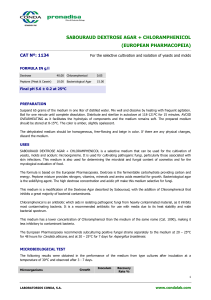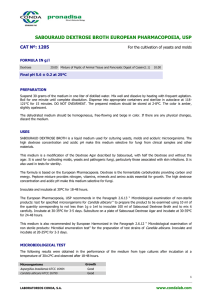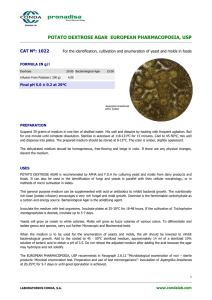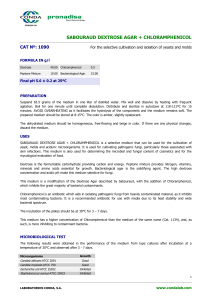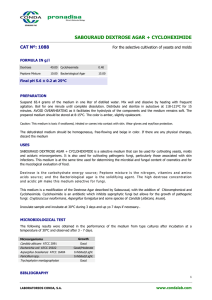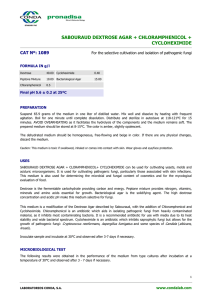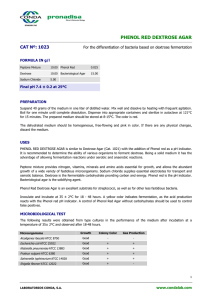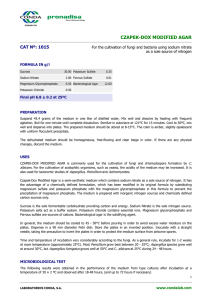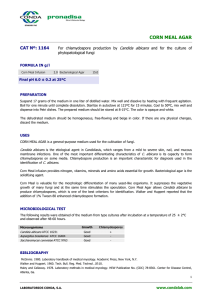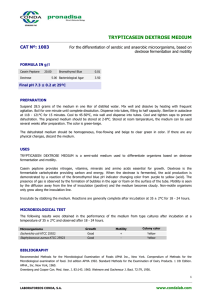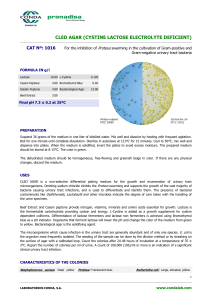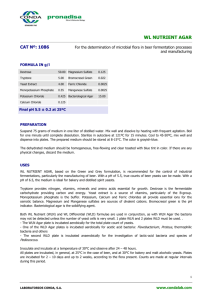Sabouraud Dextrose Agar: Culture Medium for Yeasts & Molds
advertisement
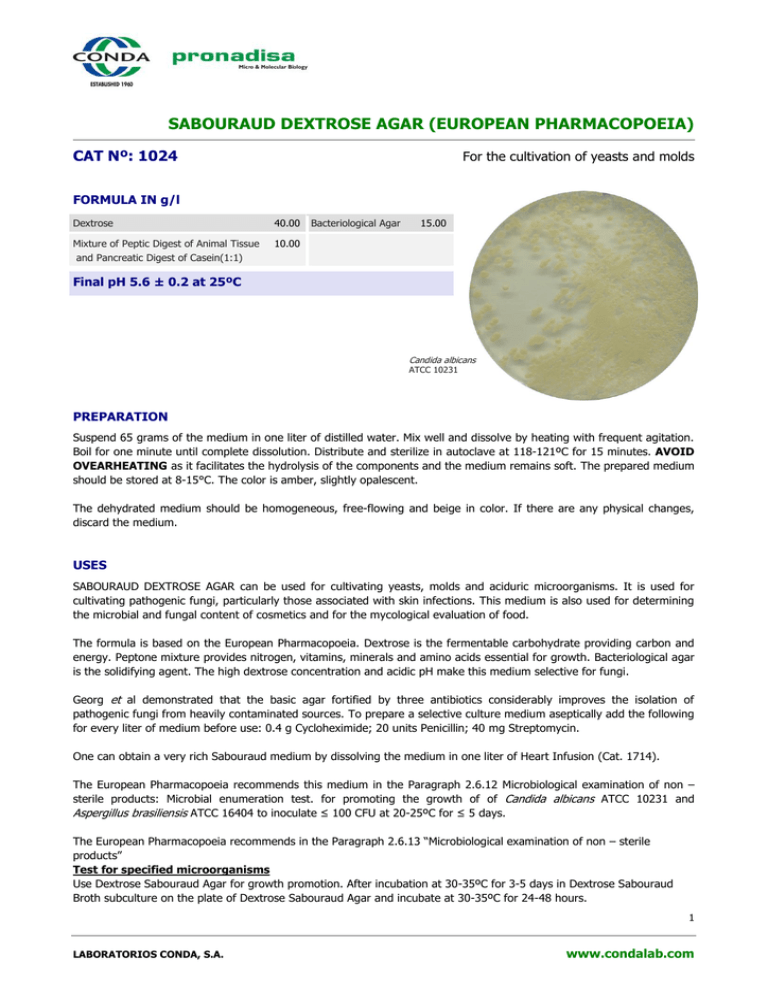
SABOURAUD DEXTROSE AGAR (EUROPEAN PHARMACOPOEIA) CAT Nº: 1024 For the cultivation of yeasts and molds FORMULA IN g/l Dextrose 40.00 Mixture of Peptic Digest of Animal Tissue and Pancreatic Digest of Casein(1:1) 10.00 Bacteriological Agar 15.00 Final pH 5.6 ± 0.2 at 25ºC Candida albicans ATCC 10231 PREPARATION Suspend 65 grams of the medium in one liter of distilled water. Mix well and dissolve by heating with frequent agitation. Boil for one minute until complete dissolution. Distribute and sterilize in autoclave at 118-121ºC for 15 minutes. AVOID OVEARHEATING as it facilitates the hydrolysis of the components and the medium remains soft. The prepared medium should be stored at 8-15°C. The color is amber, slightly opalescent. The dehydrated medium should be homogeneous, free-flowing and beige in color. If there are any physical changes, discard the medium. USES SABOURAUD DEXTROSE AGAR can be used for cultivating yeasts, molds and aciduric microorganisms. It is used for cultivating pathogenic fungi, particularly those associated with skin infections. This medium is also used for determining the microbial and fungal content of cosmetics and for the mycological evaluation of food. The formula is based on the European Pharmacopoeia. Dextrose is the fermentable carbohydrate providing carbon and energy. Peptone mixture provides nitrogen, vitamins, minerals and amino acids essential for growth. Bacteriological agar is the solidifying agent. The high dextrose concentration and acidic pH make this medium selective for fungi. Georg et al demonstrated that the basic agar fortified by three antibiotics considerably improves the isolation of pathogenic fungi from heavily contaminated sources. To prepare a selective culture medium aseptically add the following for every liter of medium before use: 0.4 g Cycloheximide; 20 units Penicillin; 40 mg Streptomycin. One can obtain a very rich Sabouraud medium by dissolving the medium in one liter of Heart Infusion (Cat. 1714). The European Pharmacopoeia recommends this medium in the Paragraph 2.6.12 Microbiological examination of non – sterile products: Microbial enumeration test. for promoting the growth of of Candida albicans ATCC 10231 and Aspergillus brasiliensis ATCC 16404 to inoculate ≤ 100 CFU at 20-25ºC for ≤ 5 days. The European Pharmacopoeia recommends in the Paragraph 2.6.13 “Microbiological examination of non – sterile products” Test for specified microorganisms Use Dextrose Sabouraud Agar for growth promotion. After incubation at 30-35ºC for 3-5 days in Dextrose Sabouraud Broth subculture on the plate of Dextrose Sabouraud Agar and incubate at 30-35ºC for 24-48 hours. 1 LABORATORIOS CONDA, S.A. www.condalab.com Interpretation Growth of white colonies may indicate the presence of Candida albicans. This is confirmed by identification tests. The product complies with the test if such colonies are not present or if the confirmatory identification tests are negative. MICROBIOLOGICAL TEST The following results were obtained in the performance of the medium from type cultures after incubation at a temperature of 30ºC and observed after 3-7 days. Microorganisms **Aspergillus brasiliensis ATCC 16404 *Candida albicans ATCC 10231 Escherichia coli ATCC 25922 Escherichia coli ATCC 8739 Lactobacillus casei ATCC 9595 Saccharomyces cerevisiae ATCC 9763 Inoculum cfu/ml ≤100 ≤100 ≤100 ≤100 ≤100 ≤100 Growth Good Good Moderate-Good Moderate-Good Good Good Recovery Rate % 70 70 70 70 70 70 According European Pharmacopoeia 7.0 * Incubate at 30-35ºC for 24-48 hours. Total count ≤100 cfu/ml to incubate at 20-25ºC for ≤ 5 days ** Total count ≤100 cfu/ml to incubate at 20-25ºC for ≤ 5 days BIBLIOGRAPHY Sabouraud, Ann. Dermat and Syphilol 1892-3. Gerog J. Lab. CLin. Med. 67;355 1953 Murray, P.R., E.J baron, M.A. Pfaller, E.C. Tenover, and R.H. YOLKEN (ed.) 1995. Manual of clinical microbiology, 6 th ed. American Society for Microbiology, Washington, D.C Beuchat, L.R., J.E Corry, A.D King, Jr. and J.I Pitt (ed) 1986 Methods for the mycological examination of food. Plenum Pres, New York European Pharmacopoeia. 7.0 EP STORAGE 25ºC Once opened keep powdered medium closed to avoid hydration. 2ºC 2 LABORATORIOS CONDA, S.A. www.condalab.com
